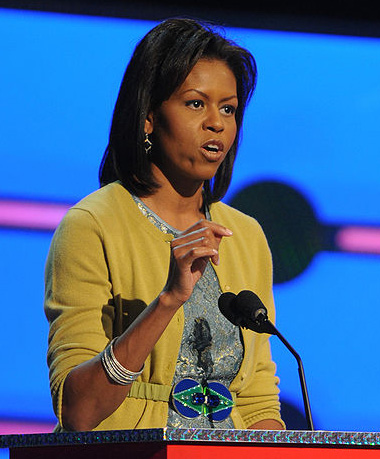Rally ’Round the Cannon: Princeton in Michelle Obama ’85’s undergraduate days
Sing a song full of the faith that the dark past has taught us,
Sing a song full of the hope that the present has brought us.
–“Lift Every Voice and Sing,” James Weldon Johnson, 1900
In my more cynical moments about Princeton (c’mon now, we all have them), I imagine events if Michelle Obama ’85 had been admitted only because she was a legacy.
Her brother, Craig Robinson ’83, was a serious catch for Pete Carril in an era when Princeton was fighting tooth-and-nail with Penn for dominance of a league where nobody else took basketball seriously; the two tied for the Ivy title his freshman and sophomore years, and he played in every game from day one. He became co-captain and the second-highest-scoring player Carril ever recruited. The image of Carril’s reaction, had he ever chanced to hear that Craig’s little sister was being hassled by admissions, conjures up the operation of the Death Star in Star Wars. There’s that momentary warmup with the background hum increasing in pitch, followed by…
Of course, that surely didn’t happen; Michelle Robinson had plenty of leverage of her own. An honors graduate of Chicago’s first and foremost magnet high school and an accomplished black female applicant in an era when the admission office was desperate to recruit both, being a legacy she was – as my dear sweet HR-speaking spouse would say – “a threefer.”
But we do need to keep in mind that 1981 Princeton was not today’s Princeton. Any student on aid (including her brother the basketball star) still at least had loans to pay back, the endowment was less than $1 billion, Toni Morrison and Cornel West *80 were not yet on the faculty, and there were five black tenured professors in total. In the entering Class of ’85, 77 percent of the students were white; for the Class of 2012, that number is 51 percent. In 1981, 63 percent of the undergraduates were male; the Class of 2012, for the first time, is essentially 50/50. Princeton had perhaps 1,000 black alumni then; now it’s more like 4,000. Work to implement the recommendations of the Committee on Undergraduate Residential Life (CURL) was in its infancy: The colleges were just beginning to take shape and the administration’s minimalist hopes for upperclass college members were on life support, not to be even partially realized for 25 years. Barton Gellman ’82, the chairman of the Prince (and now a two-time Pulitzer Prize winner at The Washington Post), wrote a blistering, self-critical column about the paper’s overwhelmingly white male staff, saying the Prince tried hard but desperately needed women and minority writers and editors to be an effective campus voice, and pleading with minorities and women to come join; from two black writers in 1977, the paper had regressed to one.
So compared with today, a black woman at Princeton in 1981 was far more marginal and exposed by definition, and let’s recall the external context as well. Although Michelle was unaware at the time, the mother of one of her freshman roommates (as memorably recounted by Sally Jacobs in The Boston Globe) demanded that her daughter be removed from the black classmate’s suite.
It is difficult to believe that Michelle Obama not only was born before Princeton became coed in 1969, she was born before Carl Fields came to campus in September 1964, essentially the beginning of any functional African-American presence in the University, and 11 years before her high school in Chicago was created in the aftermath of the ’60s. To say that her world – and ours – has changed dramatically in her lifetime is a colossal understatement: It has been one ceaseless, driving change. And if you have any hint of self-awareness, being a change agent is a tiring task.
Which is reflected tellingly in Michelle’s (now famous) thesis. In a disciplined effort to come to terms with the role of black Princeton alumni in the wider world, she conducted a well-designed survey of their post-Princeton attitudes and activities. She analyzed the results with detailed consideration not only of the alums’ upbringing and education, but even whether they had, for example, gone to a predominantly black elementary school, then to a predominantly non-black secondary school before coming to Princeton. When her initial hypothesis – that a person’s prior involvement in black culture would affect his associations at Princeton and similarly afterward – was not fully supported by the data, she proposed an alternative: that the majority of blacks identified more with blacks while attending Princeton than they had before, then less afterward, regardless of their background. This revision certainly was a typical result to a probing first-cut sociological study. Crucially, she also pointed out that an alum’s identification with overt elements of black culture at any given time seemed completely independent of the individual’s support for the advancement of the black community. Like 44 percent of the Class of 1985, Michelle Robinson graduated with honors for her work, clearly with expanded understanding of the complex world of race relations in which she knew she had to live and (keeping in mind her acceptance to Harvard Law) possibly lead. As they say, the rest …
By coincidence, Michelle Obama’s 25th reunion is coming up in 16 months. I’d like to think it would be fun for her to come back and catch up with friends, but of course it would be a three-ring circus. I’m waiting for the ominous knock of campus security at my door for even mentioning it. If asked, I would give my standard warning: never come back for the first time at your 25th. Sneak onto campus a few months beforehand, walk around, chat up some faculty, take an Orange Key tour. Look at the construction at the new Carl Fields Center. Wander through Nassau Hall, Frist, and the Treehouse at the Lewis Library, meet some students. Watch the sun set. Call up some classmates, chat about things. At that point, you’ll know if you’re up for Reunions. And if so, hey, come have a blast, screw the Secret Service and campus security. (Knock, knock.)
Besides, a little face time is a good idea: Malia’s going to be applying to colleges in only eight years, and just being a legacy is not what it used to be.













No responses yet